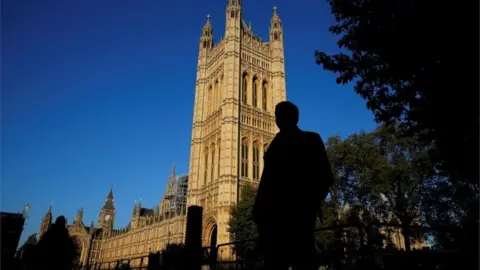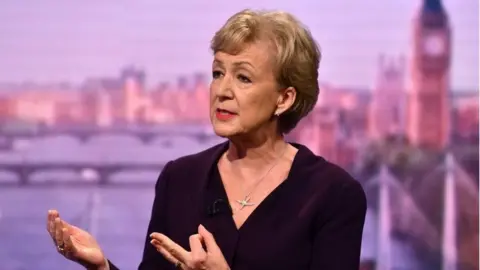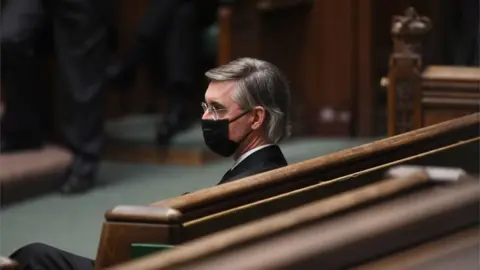'I had my political career taken away from me'
 Getty Images
Getty ImagesIn 2017, Westminster was hit by scandal, as victims - prompted by the #MeToo movement - revealed their experiences of bullying and sexual harassment while working in the Houses of Parliament.
Powerful testimony from staff members raised questions not only about the conduct of MPs, but also whether Parliament's complaints procedures was robust enough to protect its workforce.
An inquiry was launched and a new independent process for investigating complaints was set up.
On Tuesday, Welsh Conservative MP Rob Roberts faces being suspended from Parliament for six weeks after it was found he breached Parliament's sexual misconduct policy. This case took nearly a year to conclude.
The BBC has spoken to other people who have used Parliament's new system - the Independent Complaints and Grievance Scheme (ICGS) - plus the people who set it up.
They have raised concerns about the time it takes to investigate, as well as worries about whether the system still favours the powerful.
'This process just took forever'
Some of the names and personal details have been changed to protect people's identities.
Alex, a researcher in her 20s, got part way through the complaints process - before being told that her case couldn't be investigated because she had not worked in Parliament when the incidents happened.
"I was like: 'I've been through this whole thing again. Are you actually joking?'"
After further confusion and a lot of chasing, the authorities allowed one element of the complaint to be heard - and asked Alex to give another statement.
"They just used this one point and ignored all the rest of everything I'd said. It's not necessarily one incident with sexual harassment... it's the pattern of behaviour.
"That was what told me what was going on and what damaged me - the sustained pattern of behaviour - and that could no longer be evidence."
 Reuters
ReutersThe BBC understands that a common complaint among others who have experienced the process is the length of time it takes.
Jo's case took two years including an appeal and a significant failure in the process.
"They botched the first investigation," Jo told us. "I was told that it hadn't been carried out to a sufficiently thorough standard" - meaning no conclusion could be reached.
"They had to disregard that investigation and commission a new investigator.
"I had to go back to square one again - I just felt exasperated with it."
And then: "Months dragged on, the pandemic hit. I hadn't heard anything for months and months."
Another person, Ali, told us through an intermediary that the length of time the process took and a "lack of communications" made the experience difficult.
Ali spent months and months treading carefully and not sharing details of the case, to avoid putting the investigation at risk - yet found that some MPs knew more about what was happening than Ali did.
Power and careers
At the heart of many of the complaints is a hierarchical structure and power dynamic that's not unique to Parliament, but is certainly pronounced.
Junior staff often fear that speaking out might have a detrimental effect on career progression.
In 2018, a report by a high court judge found that aggressive, lewd and intimidating behaviour by MPs and senior staff had been "tolerated and concealed" for years. Another report in 2019 focused on how MPs treated their employees.
Many were described as "excellent employers, colleagues and managers" but it also found that sexual harassment was a problem, with staff being subjected to unwanted advances - often physical.
It's what happened to Alex, although the case was eventually dismissed. Alex made a complaint, after an MP she worked with tried to kiss her.
"I texted him nicely, the day after because I worked with him.
"I had to maintain a working relationship - I wasn't going to ignore him or not text back.
"And that was used against me, that I was still friendly afterwards meant it was a 'friendly' incident."
Jo told us about what it felt like when their allegations were not upheld. "Everything feels twisted - fundamentally they basically don't believe you.
"There's a scepticism to what you're saying that's bedded in at the start.
"I don't think any other workplace would tolerate that kind of attitude, in the way that any complaints are viewed with a degree of scepticism - I was gaslighted."
Alex told us: "They protected themselves, they protected the people in power at the expense of women's suffering."
For Alex the result of the investigation was devastating.
She describes a lengthy process, the outcome of which was for the MP to keep his job, pension and parliamentary pass.
"It's like nothing happened.
"I'm no longer in politics, I'm no longer a parliamentary pass holder. I had my political career taken away from me."
Jo agreed: "Power just seems to get you off the hook... I feel like it's an establishment stitch-up.
"It's just about getting an unfortunate and unwelcome investigation out of their hair - that's what it felt like to me."
Helpline calls
In its first two years, more than 100 people called Parliament's sexual misconduct helpline to raise concerns.
In the year from July 2019 to June 2020 - the first year that historic allegations were considered - 39 people called the helpline indicating they were a victim of sexual misconduct.
High profile cases that have concluded include that of former Sheffield Hallam MP Jared O'Mara, who stood down after his employee Jennifer Barnes said she quit after a string of "uncomfortable" communications.
The Parliamentary Commissioner for Standards said the messages amounted to an "abuse of power" and recommended Mr O'Mara lose his former member's pass.
The complaint took 21 months from being lodged to the report being published.
And last week, the Independent Expert Panel, which hears appeals and decides sanctions against former MPs, found that the former Labour MP Mike Hill had breached Parliament's sexual misconduct policy.
A former parliamentary worker alleges Mr Hill sexually harassed and bullied her over a 16-month period, groping and rubbing himself against her.
The panel's report highlighted "serious errors" made by the person who was appointed to investigate the case earlier in the process, which led to part of the original finding being overturned towards the end of the process, when the complainant appealed.
"The investigator raised the standard of proof... to a level which was higher than justified," the panel's report said.
"He wrongly stated that the allegation needed to be proved with evidence which is 'very compelling'."
In fact, the requirement is a "balance of probabilities test" - whether it is decided that the incident is more likely than not to have happened.
So what do those who set up the system think?

The Conservative MP Andrea Leadsom, former Leader of the Commons, believes Parliament should be proud of the system she helped set-up in collaboration with all of Westminster's political parties.
But she said it needs improving. "The problem is I don't think it has been implemented strictly to the letter of what we set out to do.
"And that's not anyone's malicious intent, but justice delayed is justice denied.
"If it's going to take a year plus to resolve, that's going to undermine the credibility of the scheme."
Mrs Leadsom said the answer is some kind of service level agreement setting out clear timescales, so complainants know they'll see their case progress at a guaranteed pace.
"There needs to be much more communication with the complainant and the person being complained about... and those deadlines need to be stuck to.
"Whether that needs more resources or needs to be more fleet of foot I don't know but I certainly think we've got to speed things up."
Her successor Leader of the House of Commons Jacob Rees-Mogg said that the government continued to support Parliament in implementing a recent review to improve the system.
He added: "More needs to be done to build confidence in the scheme throughout the parliamentary community, particularly by ensuring that investigations are fair and follow due process."
 PA Media
PA MediaIn fact, the parliamentary grievance system is still evolving.
In 2019, the Commons voted to allow old claims of sexual misconduct to be reopened, and last year the Independent Expert Panel was introduced, which finally removes MPs from the process.
But there is still an anomaly that some are concerned about.
If an MP is suspended by the Commons Standards Committee, the Recall of MPs Act applies - meaning constituents can trigger a by-election and vote on whether to boot the MP out.
But if the suspension is imposed by the newly-appointed Independent Expert Panel, however, that is not the case.
As one senior MP puts it: "It raises the absurd possibility that an MP can face a by-election for a financial misdemeanour but not for sexual misconduct."
A House of Commons spokesperson said it was committed to streamlining the ICGS process in the coming months, adding: "Bullying and harassment and sexual harassment have absolutely no place in Parliament.
"The ICGS team have already commenced a review of the investigations process, analysing each stage end-to-end to ensure that users are fully equipped with the right information about any investigation."
The right direction?
It is too early to tell if Parliament's procedure meets the 'gold standard' it set out to, but its current problems are widely recognised and it seems, at least, to be heading in the right direction.
But this is a problem that stretches across Westminster - and beyond.
Parliament has at least started to get its house(s) in order.
It seems to be a very different case within the UK's political parties, where activists tell us of continued accusations - from all quarters - of serious sexual assault and harassment cases being brushed under the carpet, dragged out and used as ammunition in political battles.
As one senior politician put it: "They need an independent process but they don't want to give up their control over it."
Whether any are prepared to follow Parliament's lead is yet to be seen - and remains a source of anger for activists of all stripes.

How does the complaints process work?
The process covers bullying, harassment and sexual misconduct complaints against Parliamentary pass holders.
1. Call the helpline to report an incident and/or access specialist support.
2. The ICGS team allocates an independent investigator, who makes an initial assessment of the case.
3. This investigator gathers evidence to see whether the complaint meets the eligibility criteria to continue, and whether it meets the threshold of bullying and harassment or sexual misconduct.
4. If the complaint is against an MP, the investigator's initial assessment of the case is sent to Parliament's Commissioner for Standards, who then oversees the process.
5. If the complaint can proceed, the investigator carries out a full investigation and writes a report.
6. If the complaint is against an MP, the investigator gives report to Parliament's Standards Commissioner with a recommendation on the verdict.
7. The Commissioner reviews the report, evidence and conclusion. If rules have been breached they can demand an apology to the House or, if they feel a more severe sanction is needed, they refer it to a separate independent expert panel.
8. This independent panel does not include any MPs. It decides sanctions and hears appeals, which could include the suspension or expulsion of an MP.
9. If it decides on suspension or expulsion, this would need to be voted on by MPs.

